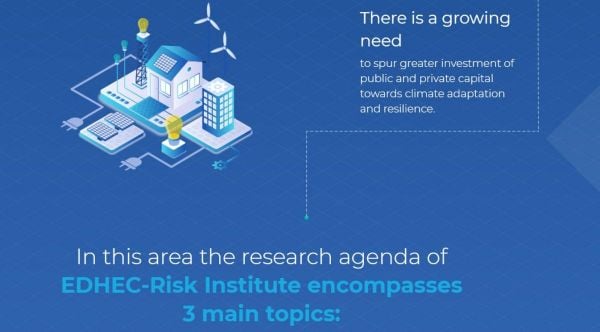
Financing the Climate Transition
Sustainable finance can mitigate climate change and help adaptation strategies in several ways. In terms of mitigation, finance can contribute to the reduction of greenhouse gas emissions by efficiently pricing the social cost of carbon, by reflecting the transition risks in the valuation of financial assets, and by channelling investments in low-carbon technologies. At the same time, there is a growing need to spur greater investment of public and private capital towards climate adaptation and resilience.
The research agenda of EDHEC-Risk Institute in this area encompasses three main topics:
Specialized financial instruments and investors
New asset classes (green bonds, carbon funds) have been created to tackle climate change. Specialized investment funds and vehicles have also emerged with the objective of addressing climate issues. Alternative finance (crowdfunding) is emerging as a channel to both finance small-scale clean energy projects and fund early stage innovative clean technologies. While all these financial instruments and funds prioritize the achievement of climate objectives, are they able to deliver on stated objectives without sacrificing financial returns? Are they able to attract private capital efficiently?
Integrating climate risks into corporate financial management
Corporate leaders need to operate in a world in which climate change affects sea levels, ambient temperature, freshwater availability, and the intensity and frequency of adverse weather events, with disproportionate implications for the world’s more vulnerable populations and major changes in our energy systems. In light of the opportunities to mitigate climate change and adapt to its physical and social consequences, managers need to know how to effectively adjust the way they plan, forecast, innovate, invest, finance, insure and manage corporations and supply chains. For example, internal carbon pricing mechanisms enable capital budgeting decisions that fully reflect the exposure to climate transition risks.
Climate-footprint metrics and greenwashing
As climate change increasingly challenges business models, the disclosure of firms’ environmental performance is attracting growing attention from corporate stakeholders. Even though information about corporate greenhouse gas emissions has become increasingly important in the business and policy-making spheres, several important limitations associated with data quality and comparability have emerged and remain widely unresolved. We aim to issue academically sound recommendations and create analytical tools that will offer investors, policymakers and regulators a more informed appraisal of emission data and related carbon risks, regardless whether they are self-reported by corporations or estimated by third parties.
In illustration: The impact on climate change of financial decisions


